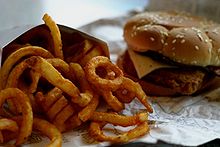- Western pattern diet
-
The Western pattern diet, also called Western dietary pattern or the meat-sweet diet, is a dietary habit chosen by many people in developed countries, and increasingly in developing countries.[1] It is characterized by high intakes of red meat, sugary desserts, high-fat foods, and refined grains.[2] It also typically contains high-fat dairy products, high-sugar drinks, and eggs.[3]
The term is used to describe this pattern of diet in medical literature, regardless of where the diet is found, and is often contrasted with the "prudent" diet,[vague] which has higher levels of fruits, vegetables, whole-grain foods, poultry and fish.[4] Other dietary patterns described in the medical research include "drinker" and "meat-eater" patterns.[5] Because of the variability in diets, individuals are usually classified not as simply "following" or "not following" a given diet, but instead by ranking them according to how closely their diets line up with each pattern in turn. The researchers then compare the outcomes between the group that most closely follows a given pattern to the group that least closely follows a given pattern.
Contents
Medical effects
Compared to the "prudent" diet,[vague] the Western pattern diet, based on epidemiological studies of Westerners, is positively correlated with an elevated incidence of obesity,[4] death from heart disease, cancer (especially colon cancer[5]), and other 'Western pattern diet' related diseases.[6]
Standard American Diet
The "Standard American Diet" (S.A.D.) is a similar term, specifically used to denigrate what some authors say is the stereotypical diet of Americans.
See also
- Fast food
- Junk food
- European cuisine (also called Western cuisine)
- Mediterranean diet
- Healthy diet
- Nutritional gatekeeper
References
- ^ Lifestyle Choices and the Risk of Cancer. CancerWire via PolyMVA blog. September 6th, 2007. [1]
- ^ Diet Appears to Influence Colon Cancer Outcomes, Allison Gandey, August 17, 2007. [2]
- ^ Halton TL, Willett WC, Liu S, Manson JE, Stampfer MJ, Hu FB (February 2006). "Potato and french fry consumption and risk of type 2 diabetes in women". Am. J. Clin. Nutr. 83 (2): 284–90. PMID 16469985. http://www.ajcn.org/cgi/pmidlookup?view=long&pmid=16469985.
- ^ a b Fung TT, Rimm EB, Spiegelman D, et al. (January 2001). "Association between dietary patterns and plasma biomarkers of obesity and cardiovascular disease risk". Am. J. Clin. Nutr. 73 (1): 61–7. PMID 11124751.
- ^ a b Kesse E, Clavel-Chapelon F, Boutron-Ruault MC (December 2006). "Dietary patterns and risk of colorectal tumors: a cohort of French women of the National Education System (E3N)". Am. J. Epidemiol. 164 (11): 1085–93. doi:10.1093/aje/kwj324. PMC 2175071. PMID 16990408. http://www.pubmedcentral.nih.gov/articlerender.fcgi?tool=pmcentrez&artid=2175071.
- ^ Heidemann C, Schulze MB, Franco OH, van Dam RM, Mantzoros CS, Hu FB (July 2008). "Dietary patterns and risk of mortality from cardiovascular disease, cancer, and all causes in a prospective cohort of women". Circulation 118 (3): 230–7. doi:10.1161/CIRCULATIONAHA.108.771881. PMC 2748772. PMID 18574045. http://www.pubmedcentral.nih.gov/articlerender.fcgi?tool=pmcentrez&artid=2748772.
Categories:- Diets
- Western cuisine
- Food stubs
Wikimedia Foundation. 2010.

